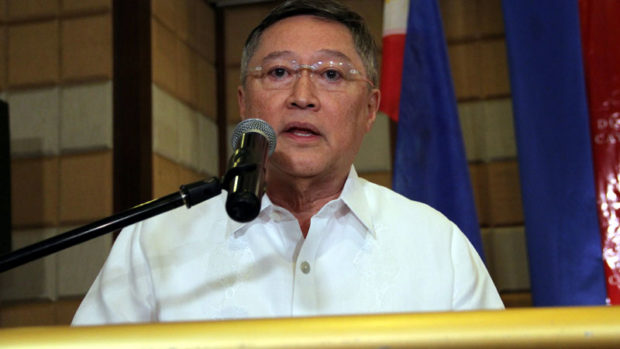
Finance Secretary Carlos G. Dominguez III INQUIRER File Photo
The head of the Duterte administration’s economic team expects a boost in foreign direct investment (FDI) inflows in the latter part of the year after two multinational firms infused $2.3 billion in capital to local companies.
Reacting to “unfounded concerns” on claims that FDI drastically dropped during the first six months, Finance Secretary Carlos G. Dominguez III said in a statement Friday that “some quarters… have failed to present the complete picture, omitting reinvestments that should have been included in assessing FDI data.”
“(They have) not captured the entire data, and reinvestments by foreign companies in the Philippines have actually been quite healthy,” Dominguez explained.
Early this month, Sen. Franklin Drilon said the entry of new investments, not money reinvested in existing businesses, dropped 90.3 percent to $141 million in the first six months of 2017 from $1.448 billion a year ago, citing end-June FDI data from the Bangko Sentral ng Pilipinas.
But Socioeconomic Planning Secretary Ernesto M. Pernia had said Sen. Drilon should not focus on figures on “new” FDI, as it was merely a component of total FDI.
“Sen. Drilon narrowly looks at so-called ‘new’ FDIs only. Fact it with reinvestments reckoned as well, drop in total FDIs was only 14 percent by the second quarter, not 90 percent,” according to Pernia, who heads the state planning agency National Economic and Development Authority.
“Reinvestments are just as good as expansion of operations does create employment multipliers, too. This is the standard method of measuring FDIs,” Pernia had pointed out.
Moving forward, Dominguez was optimistic that two recently infused FDIs will bolster this year’s inflows—the $1.3-billion deal between Energy Development Corp. and the consortium of Macquarie Infrastructure and Real Assets and Arran Investment Pte. Ltd., as well as the $1-billion acquisition of homegrown cigarette manufacturer Mighty Corp. by Japan Tobacco International’s Philippine unit.
“Investor confidence has been boosted by such initiatives as the higher public spending on infrastructure and other priority programs, tax reform, and trimming of the Foreign Negative Investment List (FINL),” Dominguez said.
The latest BSP data showed that as of end-July, equity other than reinvestment of earnings dropped 81.5 percent to $272 million from $1.471 billion in the first seven months of last year.
Including all FDI components, the net inflow of job-creating FDI from January to July declined 16.5 percent to $3.904 billion from $4.677 billion a year ago.
The year-on-year drop in seven-month FDI was attributed by the BSP to lower inflows of net equity capital—at $272 million, down from last year’s $1.5 billion.
In July alone, FDI declined by a faster 37.9 percent to $307 million from a year ago’s $493 million, while also reversing the 182.7-percent jump posted in June.
The July FDI figure was the lowest monthly inflow in 13 months, or since the $238 million posted in June last year, BSP data showed. /jpv